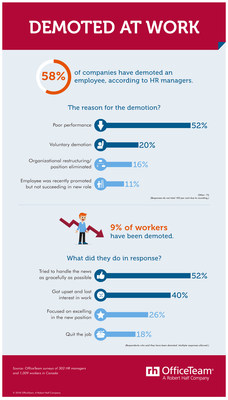Jillian Levick
Senior PR and Communications Manager
Robert Half Canada Inc.,
181 Bay Street, Suite 820,
Toronto, ON
M5J 2T3
www.roberthalf.ca
Press Releases
Read about our latest research, including results from our ongoing surveys of senior managers and workers, and company announcements.

- Nearly one in 10 workers have been moved to a lower role at a job; it's happened most to male professionals and those ages 35 to 54
- 40 per cent of employees who were demoted became disengaged; 18 per cent quit
TORONTO, Aug. 9, 2018 /CNW/ - How common are demotions at work? According to new research from staffing firm OfficeTeam, more than half of HR managers (58 per cent) have seen someone at their company moved down a rung on the career ladder. Professionals were most commonly demoted for poor performance (52 per cent) and voluntary demotion (20 per cent).

A separate survey found that nearly one in 10 workers (9 per cent) have been asked to take on a lower role. In terms of gender, 11 per cent of male professionals were demoted versus 8 per cent of women. Employees ages 35 to 54 (10 per cent) were downgraded positions more often than those ages 18-34 (9 per cent) and 55 and older (7 per cent).
HR managers were asked, "Has an employee ever been demoted at your company?" Their responses:
|
Yes |
58% |
|
No |
42% |
|
100% |
HR managers who said an employee has been demoted were also asked, "What was the reason for the demotion?" Their responses:
|
Poor performance |
52% |
|
Voluntary demotion |
20% |
|
Organizational restructuring/position eliminated |
16% |
|
Employee was recently promoted but not succeeding in new role |
11% |
|
Other |
1% |
|
100% |
Additional findings:
- HR managers at companies with 1,000 or more employees were most likely to have seen a worker demoted (83 per cent).
- While 52 per cent of professionals who were downgraded positions tried to handle the news as gracefully as possible, 40 per cent got upset and lost interest in work, and 18 per cent quit.
- Male employees (23 per cent) and those ages 18 to 34 (28 per cent) most often resigned in response to being demoted.
"However difficult it may be to move into a lower position, it can also be an opportunity for workers to reevaluate what they really want out of their careers," said Koula Vasilopoulos, a district president for OfficeTeam. "By understanding the basis for the demotion and focusing on professional development and growth, employees may find greater job satisfaction and better position themselves for advancement in the future."
OfficeTeam offers three tips for workers when dealing with an involuntary demotion:
- Remain calm. Focus on understanding why your role is being downgraded.
- Get details. Find out what's expected in the new position and if there are steps you can take to be reinstated in your previous job. Ask your manager to identify areas for improvement and training opportunities.
- Weigh the options. Think through the changes before deciding whether you want to make the most of the role or look for a different one that better suits your long-term goals.
About the Research
The surveys were developed by OfficeTeam and conducted by independent research firms. They include responses from more than 300 HR managers at Canadian companies with 20 or more employees and more than 1,000 Canadian workers 18 years of age or older and employed in office environments.
OfficeTeam
OfficeTeam, a Robert Half company, is the nation's leading staffing service specializing in the temporary placement of highly skilled office and administrative support professionals. The company has more than 300 locations worldwide. For additional information, visit roberthalf.ca/officeteam. Follow roberthalf.ca/blog for career and management advice.
SOURCE OfficeTeam
